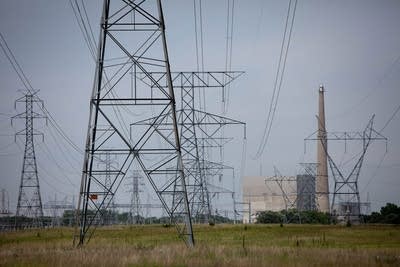Minneapolis debates getting into electricity business
Go Deeper.
Create an account or log in to save stories.
Like this?
Thanks for liking this story! We have added it to a list of your favorite stories.

The city of Minneapolis is considering whether to get into the electricity business.
Under pressure from environmentalists who say Xcel Energy isn't doing enough to combat global warming, several city council members want to put a question on the November ballot that would let voters decide if the city should pursue forming a public utility for electrical service. The city already has a public water utility.
Xcel Energy, which has served the city for than a century, has vowed to fight the proposal. It will make its case today during a public hearing on the issue, where advocates of a city utility also will testify.
The Minneapolis Energy Options campaign has worked hard to push for the referendum.
Turn Up Your Support
MPR News helps you turn down the noise and build shared understanding. Turn up your support for this public resource and keep trusted journalism accessible to all.
"We've door-knocked 55,000 doors in the city of Minneapolis," campaign manager Dylan Kesti said. "The campaign is growing and it's moving and it's on track to win in November."
Kesti said the campaign aims to help Minneapolis reach its goal of reducing greenhouse gas emissions by 30 percent over the next 12 years. He said Xcel obtains too much of it energy burning coal and natural gas.
"We don't have natural gas or coal reserves in the state of Minnesota," Kesti said. "So we're importing polluting energy instead of local economic investment in our state and in our city." Kesti's organization originally targeted the city's natural gas provider, too. But last week, the group struck a deal with CenterPoint Energy, which agreed to increase its conservation efforts.
"We would only do it as a city, if we could do it as reliably, affordably and with as much renewable -- probably more renewable energy than Xcel."
The referendum, if approved by voters, would not obligate Minneapolis to form a utility.
"We would only do it as a city, if we could do it as reliably, affordably and with as much renewable -- probably more renewable energy than Xcel," said Council Member Cam Gordon, who supports the proposal.
Gordon wants the city to rely less on coal and natural gas and more on wind, solar and other forms of renewable energy.
Xcel Energy opposes putting the issue to voters.
"The question would be to authorize the city to go forward and municipalize," said Laura McCarten, the company's regional vice president. "That's how people will understand it. And if the voters were to say yes, then they would expect the city go forward and carry out that directive."
McCarten said Xcel is already reducing emissions, and wants to help Minneapolis achieve its environmental goals. But she argues the effort to form a municipal utility would be divisive and, if it succeeds, expensive.
"It's hard to even know, today, what that total cost would be," she said. "We're confident it's billions, but part of the problem is we don't even know how many billion."
Proponents of a municipal utility say the city needs to do a detailed analysis to determine the cost. If Minneapolis were to form a utility, it would have to buy all the power lines, poles and other equipment Xcel owns in the city.
Under state law, the city would have to pay more than the fair market value of those assets -- pushing the price higher.

Council President Barb Johnson said the cost is just one of the problems with the proposal.
"I love our employees, and I think we have really great people working for the city," Johnson said. "But I think it would be a stretch to take on a whole new business line that we've never been involved with."
More than 100 Minnesota cities run their own electric utilities. The largest is Rochester. Nationwide, 1 in 7 Americans uses power from a municipal utility. The vast majority of public utilities were formed decades ago, but there are some recent exceptions.
Among them is Winter Park, Fla., an upscale suburb of 28,000 near Orlando.
A big reason the reason the city decided to get into the electricity business was to protect its oak trees, which frequently lose limbs during summer storms, city manager Randy Knight said. When that occurs, it knocks down power lines.
Fed up with the outages, city leaders decided about 13 years ago to get rid of the local power company, Progress Energy Florida. It took five years and $53 million, but the city succeeded, and it is on track to bury all of its power lines over 15 years.
Today, Knight said, service is more reliable and energy bills are about the same.
"It was definitely worth it for the city of Winter Park," he said. "I don't say that to mean it's worth it for any city, because it's a tough battle."
Minneapolis is spending a $250,000 to study the obstacles it will face if it tries to form a municipal utility for electricity. A report is expected early next year, several months after the proposed referendum could go before voters.



